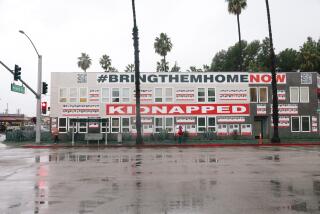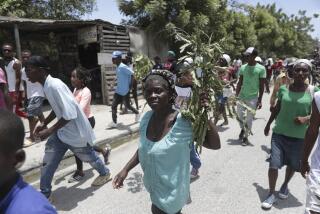Aid Group Leader Hassan Believed Slain by Captors
- Share via
LONDON — Relatives of aid worker Margaret Hassan said Tuesday that they believed her captors in Iraq had killed her, four weeks after she was kidnapped on a Baghdad street.
Hassan’s Iraqi husband, Tahseen Ali Hassan, told the British Broadcasting Corp. that a videotape appeared to show her death.
“The video may be genuine, but I do not know,” he said. “I beg those people who took Margaret to tell me what they have done with her.
“I need her, I need her back to rest in peace. Margaret lived with me in Iraq for 30 years. She dedicated her life to serving the Iraqi people. Please now, please return her to me,” he pleaded.
In London, the brother and three sisters of the Irish-born Hassan, who headed CARE International in Iraq for the last decade, released a statement saying, “Our hearts are broken.”
“We have kept hoping for as long as we could, but we now have to accept that Margaret has probably gone and at last her suffering has ended,” they said.
Gunmen abducted Hassan, 59, as she arrived at work Oct. 19. Videos later showed her pleading for her life and relaying the kidnappers’ demand for the withdrawal of British troops from Iraq and the release of women prisoners held by U.S.-led forces.
A critic of the American and British invasion of Iraq in 2003, Hassan was admired in the humanitarian community for her commitment to the Iraqi people. She remained in her adopted country through the years of war, embargo and economic hardship.
The statement from Hassan’s brother and sisters, released in London by the Foreign Office, said her slaying was unforgivable.
“Those who are guilty of this atrocious act, and those who support them, have no excuses,” the statement said. “Nobody can justify this. Margaret was against sanctions and the war. To commit such a crime against anyone is unforgivable. But we cannot believe how anybody could do this to our kind, compassionate sister. The gap she leaves will never be filled.”
A longtime friend of Hassan’s, British freelance journalist Felicity Arbuthnot, said in a phone interview Tuesday in London that Hassan had fallen in love with Iraq as a young woman and had fought for the “lost generation” of Iraqi children during sanctions against Saddam Hussein’s regime. Her final act as she was being kidnapped last month was to plead with her abductors to spare her driver and bodyguard.
“She said, ‘Please stop beating them, I will come with you.’ The last thing she did was try to protect Iraqis,” Arbuthnot said.
“I feel so angry,” she said. “Nobody listened to any of those who knew Iraq.... We went into a faraway place of which we knew nothing, and the most innocent are paying the price.”
Hassan had testified to a British parliamentary committee that Iraqi society could not withstand an invasion, Arbuthnot said.
Nothing had been heard of Hassan for several weeks, but the satellite television channel Al Jazeera reported Nov. 2 that her captors had threatened to turn her over to Abu Musab Zarqawi, the Jordanian-born militant who is believed to have carried out beheadings of Western hostages and masterminded a series of attacks against the U.S. and its allies in Iraq.
Zarqawi’s capture was one aim of the U.S.-led assault on the rebel bastion of Fallouja, but American intelligence officials now believe he escaped. A statement issued in his name Monday exhorted Iraqis to continue the violence against U.S. forces.
Irish Prime Minister Bertie Ahern was among the political and religious leaders who had appealed for Hassan’s release. In addition to Iraqi and British citizenship, Hassan held an Irish passport.
Her siblings, Michael, Deirdre, Kathryn and Geraldine, described her as a “friend of the Arab world, to people of all religions.”
CARE issued a statement from Amman, Jordan, expressing “profound sadness” and calling Hassan “an extraordinary woman who dedicated her life to the poor and disadvantaged in Iraq, particularly the children. The whole of CARE is in mourning.”
The statement said that more than 17 million Iraqis had received help through CARE during the time that Hassan directed its operations in Iraq. Since her abduction, the organization has suspended work in the country.
After she was seized, her family repeatedly asked for her release, emphasizing that she was a humanitarian worker and a convert to Islam.
More to Read
Sign up for Essential California
The most important California stories and recommendations in your inbox every morning.
You may occasionally receive promotional content from the Los Angeles Times.










